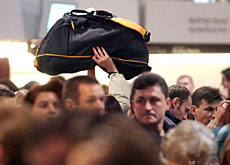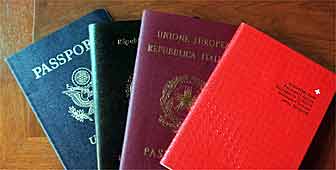Immigrants get easier path to Swiss citizenship

Parliament has approved a government proposal to grant automatic citizenship to third-generation immigrants if certain conditions are fulfilled.
The Senate vote comes amid moves to improve integration of foreigners and ease restrictions on naturalisation for immigrants.
Around 440,000 foreigners living in Switzerland are second or third-generation immigrants. They constitute six per cent of the population and a quarter of all registered foreigners.
But despite often being born in Switzerland, raised there and having little or few ties to their parents’ country of origin, they are still not Swiss enough for some Swiss.
No incentive
And Switzerland’s tortuous naturalisation procedure doesn’t necessarily encourage them to take up citizenship.
It takes up to 12 years residence before a foreigner can apply, large sums of money can be involved, and making a request does not guarantee a Swiss passport.
This difficult process means that Switzerland has one of the lowest levels of naturalisation in Europe.
The government wants to improve the integration of the foreign community, and granting automatic citizenship to third-generation immigrants is one way of reaching that goal.
Roland Scherer of the Federal Immigration, Integration and Emigration Office says that parents will get the final word on their children becoming Swiss.
“A third-generation child should get Swiss citizenship at birth, but the parents can veto that administrative decision during one year,” he told swissinfo. If this were to happen, the child could always request Swiss nationality at the age of 18.
Both the House of Representatives and the Senate have agreed on the conditions for granting automatic citizenship.
The child will have to have been born in Switzerland, and one of the parents will have to have attended a Swiss school for five years, as well as held a valid resident’s permit for at least five years.
Up to 10,000 children could get Swiss citizenship each year this way.
The rightwing People’s Party maintains that government proposal to grant automatic citizenship is the wrong approach to improved integration.
“You shouldn’t start by being Swiss and then trying to learn what it is to be a Swiss person,” said Aliki Panyides, the party’s vice secretary general.
Referendum issue
The proposed changes in the citizenship law imply modifying the Constitution, and therefore a compulsory nationwide vote on the issue.
The only time the Swiss voted on the easing of its citizenship law for young immigrants, in 1994, it was rejected.
But a survey published on Tuesday suggested three out of four Swiss would favour moves to make it easier for immigrants to acquire citizenship.
Also on Tuesday, the Senate gave its approval to easing citizenship rules for young second-generation immigrants.
Those between the ages of 18 and 24 will be able to ask for a simplified procedure if they have spent at least five years in a Swiss school and lived in their community at least two.
However, the senators refused to introduce a right of appeal against negative citizenship decisions despite government pressure.
Justice minister Ruth Metzler said that Switzerland is the only country in Europe without an appeals’ procedure for naturalisation decisions.
The issue came to a head when popular votes in some municipalities led to some citizenship requests being turned down, in particular those from immigrants from the Balkans.
swissinfo, Scott Capper
The Senate has approved a government proposal to grant automatic citizenship to third-generation immigrants.
Around 440,000 second and third-generation foreigners live in Switzerland.
They consitute six per cent of the population, and one quarter of all registered foreigners in Switzerland.
Foreign parents would get to veto their children’s Swiss citizenship during one year.
Up to 10,000 children could benefit from automatic citizenship each year.

In compliance with the JTI standards
More: SWI swissinfo.ch certified by the Journalism Trust Initiative




You can find an overview of ongoing debates with our journalists here. Please join us!
If you want to start a conversation about a topic raised in this article or want to report factual errors, email us at english@swissinfo.ch.